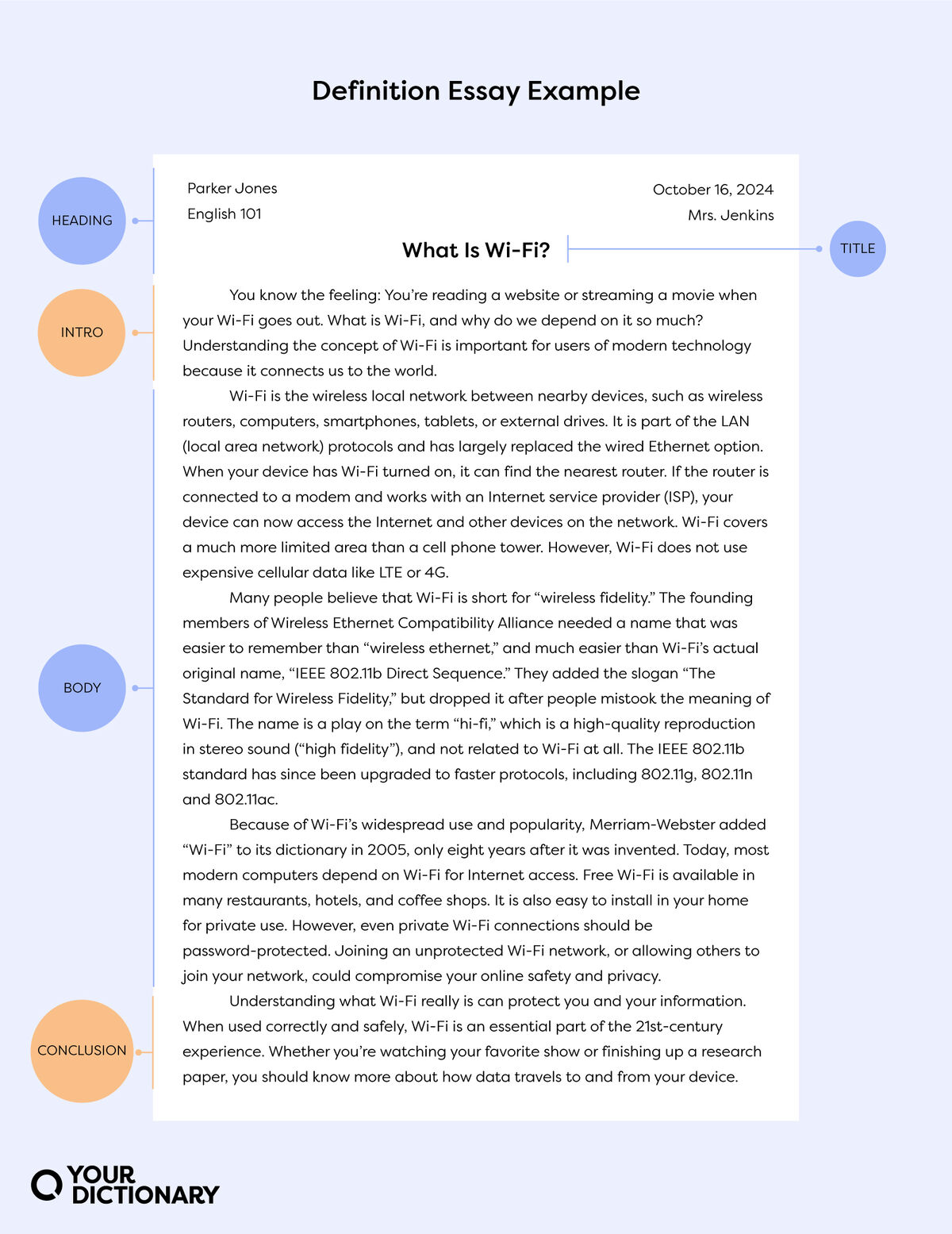Definition of Essay
Essay is derived from the French word essayer , which means “ to attempt ,” or “ to try .” An essay is a short form of literary composition based on a single subject matter, and often gives the personal opinion of the author. A famous English essayist, Aldous Huxley defines essays as, “a literary device for saying almost everything about almost anything. ” The Oxford Dictionary describes it as “ a short piece of writing on a particular subject. ” In simple words, we can define it as a scholarly work in writing that provides the author’s personal argument .
- Types of Essay
There are two forms of essay: literary and non-literary. Literary essays are of four types:
- Expository Essay – In an expository essay , the writer gives an explanation of an idea, theme , or issue to the audience by giving his personal opinions. This essay is presented through examples, definitions, comparisons, and contrast .
- Descriptive Essay – As it sounds, this type of essay gives a description about a particular topic, or describes the traits and characteristics of something or a person in detail. It allows artistic freedom, and creates images in the minds of readers through the use of the five senses.
- Narrative Essay – Narrative essay is non- fiction , but describes a story with sensory descriptions. The writer not only tells a story, but also makes a point by giving reasons.
- Persuasive Essay – In this type of essay, the writer tries to convince his readers to adopt his position or point of view on an issue, after he provides them solid reasoning in this connection. It requires a lot of research to claim and defend an idea. It is also called an argumentative essay .
Non-literary essays could also be of the same types but they could be written in any format.

Examples of Essay in Literature
Example #1: the sacred grove of oshogbo (by jeffrey tayler).
“As I passed through the gates I heard a squeaky voice . A diminutive middle-aged man came out from behind the trees — the caretaker. He worked a toothbrush-sized stick around in his mouth, digging into the crevices between algae’d stubs of teeth. He was barefoot; he wore a blue batik shirt known as a buba, baggy purple trousers, and an embroidered skullcap. I asked him if he would show me around the shrine. Motioning me to follow, he spat out the results of his stick work and set off down the trail.”
This is an example of a descriptive essay , as the author has used descriptive language to paint a dramatic picture for his readers of an encounter with a stranger.
Example #2: Of Love (By Francis Bacon)
“It is impossible to love, and be wise … Love is a child of folly. … Love is ever rewarded either with the reciprocal, or with an inward and secret contempt. You may observe that amongst all the great and worthy persons…there is not one that hath been transported to the mad degree of love: which shows that great spirits and great business do keep out this weak passion…That he had preferred Helena, quitted the gifts of Juno and Pallas. For whosoever esteemeth too much of amorous affection quitted both riches and wisdom.”
In this excerpt, Bacon attempts to persuade readers that people who want to be successful in this world must never fall in love. By giving an example of famous people like Paris, who chose Helen as his beloved but lost his wealth and wisdom, the author attempts to convince the audience that they can lose their mental balance by falling in love.
Example #3: The Autobiography of a Kettle (By John Russell)
“ I am afraid I do not attract attention, and yet there is not a single home in which I could done without. I am only a small, black kettle but I have much to interest me, for something new happens to me every day. The kitchen is not always a cheerful place in which to live, but still I find plenty of excitement there, and I am quite happy and contented with my lot …”
In this example, the author is telling an autobiography of a kettle, and describes the whole story in chronological order. The author has described the kettle as a human being, and allows readers to feel, as he has felt.
Function of Essay
The function of an essay depends upon the subject matter, whether the writer wants to inform, persuade, explain, or entertain. In fact, the essay increases the analytical and intellectual abilities of the writer as well as readers. It evaluates and tests the writing skills of a writer, and organizes his or her thinking to respond personally or critically to an issue. Through an essay, a writer presents his argument in a more sophisticated manner. In addition, it encourages students to develop concepts and skills, such as analysis, comparison and contrast, clarity, exposition , conciseness, and persuasion .
Related posts:
- Elements of an Essay
- Narrative Essay
- Definition Essay
- Descriptive Essay
- Analytical Essay
- Argumentative Essay
- Cause and Effect Essay
- Critical Essay
- Expository Essay
- Persuasive Essay
- Process Essay
- Explicatory Essay
- An Essay on Man: Epistle I
- Comparison and Contrast Essay
Post navigation

- Cambridge Dictionary +Plus
Meaning of essay in English
Your browser doesn't support HTML5 audio
- I want to finish off this essay before I go to bed .
- His essay was full of spelling errors .
- Have you given that essay in yet ?
- Have you handed in your history essay yet ?
- I'd like to discuss the first point in your essay.
- boilerplate
- composition
- dissertation
- essay question
- peer review
- go after someone
- go all out idiom
- go down swinging/fighting idiom
- go for it idiom
- go for someone
- shoot the works idiom
- smarten (someone/something) up
- smarten up your act idiom
- square the circle idiom
- step on the gas idiom
essay | Intermediate English
Examples of essay, collocations with essay.
These are words often used in combination with essay .
Click on a collocation to see more examples of it.
Translations of essay
Get a quick, free translation!

Word of the Day
troubleshoot
to discover why something does not work effectively and help to improve it

Searching out and tracking down: talking about finding or discovering things

Learn more with +Plus
- Recent and Recommended {{#preferredDictionaries}} {{name}} {{/preferredDictionaries}}
- Definitions Clear explanations of natural written and spoken English English Learner’s Dictionary Essential British English Essential American English
- Grammar and thesaurus Usage explanations of natural written and spoken English Grammar Thesaurus
- Pronunciation British and American pronunciations with audio English Pronunciation
- English–Chinese (Simplified) Chinese (Simplified)–English
- English–Chinese (Traditional) Chinese (Traditional)–English
- English–Dutch Dutch–English
- English–French French–English
- English–German German–English
- English–Indonesian Indonesian–English
- English–Italian Italian–English
- English–Japanese Japanese–English
- English–Norwegian Norwegian–English
- English–Polish Polish–English
- English–Portuguese Portuguese–English
- English–Spanish Spanish–English
- English–Swedish Swedish–English
- Dictionary +Plus Word Lists
- English Noun Verb
- Intermediate Noun
- Collocations
- Translations
- All translations
To add essay to a word list please sign up or log in.
Add essay to one of your lists below, or create a new one.
{{message}}
Something went wrong.
There was a problem sending your report.
Definition of 'essay'

essay in British English
Essay in american english, examples of 'essay' in a sentence essay, cobuild collocations essay, trends of essay.
View usage for: All Years Last 10 years Last 50 years Last 100 years Last 300 years
Browse alphabetically essay
- essay competition
- essay contest
- essay discusses
- All ENGLISH words that begin with 'E'
Related terms of essay
- essay topic
- photo essay
- short essay
- View more related words
Quick word challenge
Quiz Review
Score: 0 / 5
Wordle Helper

Scrabble Tools

Thesis Statements
What this handout is about.
This handout describes what a thesis statement is, how thesis statements work in your writing, and how you can craft or refine one for your draft.
Introduction
Writing in college often takes the form of persuasion—convincing others that you have an interesting, logical point of view on the subject you are studying. Persuasion is a skill you practice regularly in your daily life. You persuade your roommate to clean up, your parents to let you borrow the car, your friend to vote for your favorite candidate or policy. In college, course assignments often ask you to make a persuasive case in writing. You are asked to convince your reader of your point of view. This form of persuasion, often called academic argument, follows a predictable pattern in writing. After a brief introduction of your topic, you state your point of view on the topic directly and often in one sentence. This sentence is the thesis statement, and it serves as a summary of the argument you’ll make in the rest of your paper.
What is a thesis statement?
A thesis statement:
- tells the reader how you will interpret the significance of the subject matter under discussion.
- is a road map for the paper; in other words, it tells the reader what to expect from the rest of the paper.
- directly answers the question asked of you. A thesis is an interpretation of a question or subject, not the subject itself. The subject, or topic, of an essay might be World War II or Moby Dick; a thesis must then offer a way to understand the war or the novel.
- makes a claim that others might dispute.
- is usually a single sentence near the beginning of your paper (most often, at the end of the first paragraph) that presents your argument to the reader. The rest of the paper, the body of the essay, gathers and organizes evidence that will persuade the reader of the logic of your interpretation.
If your assignment asks you to take a position or develop a claim about a subject, you may need to convey that position or claim in a thesis statement near the beginning of your draft. The assignment may not explicitly state that you need a thesis statement because your instructor may assume you will include one. When in doubt, ask your instructor if the assignment requires a thesis statement. When an assignment asks you to analyze, to interpret, to compare and contrast, to demonstrate cause and effect, or to take a stand on an issue, it is likely that you are being asked to develop a thesis and to support it persuasively. (Check out our handout on understanding assignments for more information.)
How do I create a thesis?
A thesis is the result of a lengthy thinking process. Formulating a thesis is not the first thing you do after reading an essay assignment. Before you develop an argument on any topic, you have to collect and organize evidence, look for possible relationships between known facts (such as surprising contrasts or similarities), and think about the significance of these relationships. Once you do this thinking, you will probably have a “working thesis” that presents a basic or main idea and an argument that you think you can support with evidence. Both the argument and your thesis are likely to need adjustment along the way.
Writers use all kinds of techniques to stimulate their thinking and to help them clarify relationships or comprehend the broader significance of a topic and arrive at a thesis statement. For more ideas on how to get started, see our handout on brainstorming .
How do I know if my thesis is strong?
If there’s time, run it by your instructor or make an appointment at the Writing Center to get some feedback. Even if you do not have time to get advice elsewhere, you can do some thesis evaluation of your own. When reviewing your first draft and its working thesis, ask yourself the following :
- Do I answer the question? Re-reading the question prompt after constructing a working thesis can help you fix an argument that misses the focus of the question. If the prompt isn’t phrased as a question, try to rephrase it. For example, “Discuss the effect of X on Y” can be rephrased as “What is the effect of X on Y?”
- Have I taken a position that others might challenge or oppose? If your thesis simply states facts that no one would, or even could, disagree with, it’s possible that you are simply providing a summary, rather than making an argument.
- Is my thesis statement specific enough? Thesis statements that are too vague often do not have a strong argument. If your thesis contains words like “good” or “successful,” see if you could be more specific: why is something “good”; what specifically makes something “successful”?
- Does my thesis pass the “So what?” test? If a reader’s first response is likely to be “So what?” then you need to clarify, to forge a relationship, or to connect to a larger issue.
- Does my essay support my thesis specifically and without wandering? If your thesis and the body of your essay do not seem to go together, one of them has to change. It’s okay to change your working thesis to reflect things you have figured out in the course of writing your paper. Remember, always reassess and revise your writing as necessary.
- Does my thesis pass the “how and why?” test? If a reader’s first response is “how?” or “why?” your thesis may be too open-ended and lack guidance for the reader. See what you can add to give the reader a better take on your position right from the beginning.
Suppose you are taking a course on contemporary communication, and the instructor hands out the following essay assignment: “Discuss the impact of social media on public awareness.” Looking back at your notes, you might start with this working thesis:
Social media impacts public awareness in both positive and negative ways.
You can use the questions above to help you revise this general statement into a stronger thesis.
- Do I answer the question? You can analyze this if you rephrase “discuss the impact” as “what is the impact?” This way, you can see that you’ve answered the question only very generally with the vague “positive and negative ways.”
- Have I taken a position that others might challenge or oppose? Not likely. Only people who maintain that social media has a solely positive or solely negative impact could disagree.
- Is my thesis statement specific enough? No. What are the positive effects? What are the negative effects?
- Does my thesis pass the “how and why?” test? No. Why are they positive? How are they positive? What are their causes? Why are they negative? How are they negative? What are their causes?
- Does my thesis pass the “So what?” test? No. Why should anyone care about the positive and/or negative impact of social media?
After thinking about your answers to these questions, you decide to focus on the one impact you feel strongly about and have strong evidence for:
Because not every voice on social media is reliable, people have become much more critical consumers of information, and thus, more informed voters.
This version is a much stronger thesis! It answers the question, takes a specific position that others can challenge, and it gives a sense of why it matters.
Let’s try another. Suppose your literature professor hands out the following assignment in a class on the American novel: Write an analysis of some aspect of Mark Twain’s novel Huckleberry Finn. “This will be easy,” you think. “I loved Huckleberry Finn!” You grab a pad of paper and write:
Mark Twain’s Huckleberry Finn is a great American novel.
You begin to analyze your thesis:
- Do I answer the question? No. The prompt asks you to analyze some aspect of the novel. Your working thesis is a statement of general appreciation for the entire novel.
Think about aspects of the novel that are important to its structure or meaning—for example, the role of storytelling, the contrasting scenes between the shore and the river, or the relationships between adults and children. Now you write:
In Huckleberry Finn, Mark Twain develops a contrast between life on the river and life on the shore.
- Do I answer the question? Yes!
- Have I taken a position that others might challenge or oppose? Not really. This contrast is well-known and accepted.
- Is my thesis statement specific enough? It’s getting there–you have highlighted an important aspect of the novel for investigation. However, it’s still not clear what your analysis will reveal.
- Does my thesis pass the “how and why?” test? Not yet. Compare scenes from the book and see what you discover. Free write, make lists, jot down Huck’s actions and reactions and anything else that seems interesting.
- Does my thesis pass the “So what?” test? What’s the point of this contrast? What does it signify?”
After examining the evidence and considering your own insights, you write:
Through its contrasting river and shore scenes, Twain’s Huckleberry Finn suggests that to find the true expression of American democratic ideals, one must leave “civilized” society and go back to nature.
This final thesis statement presents an interpretation of a literary work based on an analysis of its content. Of course, for the essay itself to be successful, you must now present evidence from the novel that will convince the reader of your interpretation.
Works consulted
We consulted these works while writing this handout. This is not a comprehensive list of resources on the handout’s topic, and we encourage you to do your own research to find additional publications. Please do not use this list as a model for the format of your own reference list, as it may not match the citation style you are using. For guidance on formatting citations, please see the UNC Libraries citation tutorial . We revise these tips periodically and welcome feedback.
Anson, Chris M., and Robert A. Schwegler. 2010. The Longman Handbook for Writers and Readers , 6th ed. New York: Longman.
Lunsford, Andrea A. 2015. The St. Martin’s Handbook , 8th ed. Boston: Bedford/St Martin’s.
Ramage, John D., John C. Bean, and June Johnson. 2018. The Allyn & Bacon Guide to Writing , 8th ed. New York: Pearson.
Ruszkiewicz, John J., Christy Friend, Daniel Seward, and Maxine Hairston. 2010. The Scott, Foresman Handbook for Writers , 9th ed. Boston: Pearson Education.
You may reproduce it for non-commercial use if you use the entire handout and attribute the source: The Writing Center, University of North Carolina at Chapel Hill
Make a Gift
- Words with Friends Cheat
- Wordle Solver
- Word Unscrambler
- Scrabble Dictionary
- Anagram Solver
- Wordscapes Answers
Make Our Dictionary Yours
Sign up for our weekly newsletters and get:
- Grammar and writing tips
- Fun language articles
- #WordOfTheDay and quizzes
By signing in, you agree to our Terms and Conditions and Privacy Policy .
We'll see you in your inbox soon.
Definition Essay Examples and Topic Ideas

- DESCRIPTION man taking notes with definition essay meaning
- SOURCE Xavier Lorenzo / Moment / Getty Images
- PERMISSION Used under Getty Images license
A formal definition essay defines a term or concept. Definition essays are a form of expository writing in which the writer provides information about the term to their audience. They typically follow a standard essay format and include both a definition and an analysis of the term. Review the example essays below and try exploring some of the suggested essay topics, too.
Definition Essay Structure
You can follow the general structure for an expository essay when writing a definition essay.

- DESCRIPTION definition essay example with notes
- SOURCE Created by Karina Goto for YourDictionary
- PERMISSION Owned by YourDictionary, Copyright YourDictionary
While the basic pieces of the essay are the same, definition essays should include some key elements.
- Introduction: Like most essays, the introduction paragraph in definition essays should start with an introduction sentence or “grabber,” followed by a transition sentence, and end with a strong thesis statement (which is often a clear statement of the definition).
- Body Paragraphs: Typical definition essays at the middle and high school level should include around three body paragraphs. They begin with relevant topic sentences . Body paragraphs can provide important information about the term, including an extended definition, etymology , denotations and/or connotations , analogies, and negation (non-examples) of the concept.
- Conclusion: Rephrase the thesis statement and make a larger statement about the term in your conclusion.
Example Essay: Wi-Fi (Concrete Concept)
There are basically two types of definition essays. They can define concrete concepts or abstract concepts. They should also provide a larger understanding of the term as a concept. Here first is an example of a definition essay for a concrete concept.
You know the feeling: You’re reading a website or streaming a movie when your Wi-Fi goes out. What is Wi-Fi, and why do we depend on it so much? Understanding the concept of Wi-Fi is important for users of modern technology because it connects us to the world. Wi-Fi is the wireless local network between nearby devices, such as wireless routers, computers, smartphones, tablets, or external drives. It is part of the LAN (local area network) protocols and has largely replaced the wired Ethernet option. When your device has Wi-Fi turned on, it can find the nearest router. If the router is connected to a modem and works with an Internet service provider (ISP), your device can now access the Internet and other devices on the network. Wi-Fi covers a much more limited area than a cell phone tower. However, Wi-Fi does not use expensive cellular data like LTE or 4G. Many people believe that Wi-Fi is short for “wireless fidelity.” The founding members of Wireless Ethernet Compatibility Alliance needed a name that was easier to remember than “wireless ethernet,” and much easier than Wi-Fi’s actual original name, “IEEE 802.11b Direct Sequence.” They added the slogan “The Standard for Wireless Fidelity,” but dropped it after people mistook the meaning of Wi-Fi. The name is a play on the term “hi-fi,” which is a high-quality reproduction in stereo sound (“high fidelity”), and not related to Wi-Fi at all. The IEEE 802.11b standard has since been upgraded to faster protocols, including 802.11g, 802.11n and 802.11ac. Because of Wi-Fi’s widespread use and popularity, Merriam-Webster added “Wi-Fi” to its dictionary in 2005, only eight years after it was invented. Today, most modern computers depend on Wi-Fi for Internet access. Free Wi-Fi is available in many restaurants, hotels, and coffee shops. It is also easy to install in your home for private use. However, even private Wi-Fi connections should be password-protected. Joining an unprotected Wi-Fi network, or allowing others to join your network, could compromise your online safety and privacy. Understanding what Wi-Fi really is can protect you and your information. When used correctly and safely, Wi-Fi is an essential part of the 21st-century experience. Whether you’re watching your favorite show or finishing up a research paper, you should know more about how data travels to and from your device.
Example Essay: Bravery (Abstract Concept)
The basic structure of a definition essay is the same whether you’re defining a concrete or abstract concept. Here is an example definition essay for an abstract concept.
Everyone feels afraid from time to time. From feeling the jitters to facing a lifelong phobia, it’s difficult to put fears aside when trying to accomplish a goal. But, one doesn’t need to forget that they are afraid in order to be brave; in fact, bravery doesn’t exist without real fear behind it. Bravery is the mindset one takes when facing a challenge that could be dangerous or difficult. The task could be objectively dangerous, such as engaging in battle or driving in adverse conditions. A person could also perceive a seemingly harmless situation as challenging, such as climbing a flight of stairs or talking to someone they’d like to date. A brave act requires one to face and embrace the task rather than withdraw from it. There are examples of bravery in every community. Look no farther than your local fire station or police station to see acts of bravery. Community heroes help others in small and large ways every day, often at great risk to their own lives. Students are brave when they stand up to a bully or present a project in front of the whole class. Practicing small acts of bravery can prepare a person to lead a heroic life. “Fearlessness” can be a connotation of bravery, but it’s not a true synonym (although bystanders may believe that a brave person acts without fear). If a task does not seem frightening in some way, it would be simple to complete, requiring no bravery at all. Heroes who exhibit bravery often put themselves at risk to help others. The closest synonym for bravery would be “courage.” The ability to do what’s right despite a real or perceived threat requires strength, making “fortitude” another near-synonym for bravery. Bravery doesn’t exist without fear. No matter how challenging or dangerous a task can be, bravery allows a person to work alongside their fear rather than forget about it. The next time you see someone acting heroically, remind yourself that they are probably terrified in that moment – and that makes them even braver.
Sample Definition Essay Topics
You just need to ask a question when finding a prompt for a definition essay. Here are some possible topics for your next definition essay. Note that the list includes both concrete and abstract terms and spans a range of subjects.
- What is democracy?
- What is classical music?
- Explain the concept of friendship.
- What is the Pythagorean Theorem?
- Define bravery.
- Define Gothic Romanticism.
- What is a cold war?
- Define the concept of grief.
- What is maturity?
- What is climate change?
- Define the concept of race as a social construct.
- What is math?
- What is a millennial?
- Define the concept of privilege.
- What is a literary theme?
- What is a political party?
- Define the concept of sportsmanship.
- What is an amphibian?
- What is chemistry?
- What was the Spanish Inquisition?
- Explain the concept of dreaming.
- What is a tomato?
- What is physical fitness?
More Essay Options
Now that you’ve got the definition essay down, take a look at more writing resources. Get some tips on writing essays or read additional examples of different essay types . If your writing is getting a bit long, learn how to write clear, concise sentences .
- Dictionaries home
- American English
- Collocations
- German-English
- Grammar home
- Practical English Usage
- Learn & Practise Grammar (Beta)
- Word Lists home
- My Word Lists
- Recent additions
- Resources home
- Text Checker
Definition of essay noun from the Oxford Advanced American Dictionary
Take your English to the next level
The Oxford Learner’s Thesaurus explains the difference between groups of similar words. Try it for free as part of the Oxford Advanced Learner’s Dictionary app

8 Grammar Terms You Used to Know, But...
8 Grammar Terms You Used to Know, But Forgot
Plus yodeling
Dictionary Entries Near subject
subjectable
Cite this Entry
“Subject.” Merriam-Webster.com Dictionary , Merriam-Webster, https://www.merriam-webster.com/dictionary/subject. Accessed 16 May. 2024.
Kids Definition
Kids definition of subject.
Kids Definition of subject (Entry 2 of 3)
Kids Definition of subject (Entry 3 of 3)
Medical Definition
Medical definition of subject, legal definition, legal definition of subject, more from merriam-webster on subject.
Nglish: Translation of subject for Spanish Speakers
Britannica English: Translation of subject for Arabic Speakers
Subscribe to America's largest dictionary and get thousands more definitions and advanced search—ad free!

Can you solve 4 words at once?
Word of the day.
See Definitions and Examples »
Get Word of the Day daily email!
Popular in Grammar & Usage
More commonly misspelled words, your vs. you're: how to use them correctly, every letter is silent, sometimes: a-z list of examples, more commonly mispronounced words, how to use em dashes (—), en dashes (–) , and hyphens (-), popular in wordplay, birds say the darndest things, the words of the week - may 10, a great big list of bread words, 10 scrabble words without any vowels, 12 more bird names that sound like insults (and sometimes are), games & quizzes.

- How to Write a Definition Essay
A definition essay can be deceivingly difficult to write. This type of paper requires you to write a personal yet academic definition of one specific word. The definition must be thorough and lengthy. It is essential that you choose a word that will give you plenty to write about, and there are a few standard tactics you can use to elaborate on the term. Here are a few guidelines to keep in mind when writing a definition essay.
Part 1 of 3: Choosing the Right Word
1: choose an abstract word with a complex meaning. [1].
A simple word that refers to a concrete word will not give you much to write about, but a complex word that refers to an abstract concept provides more material to explore.
- Typically, nouns that refer to a person, place, or thing are too simple for a definition essay. Nouns that refer to an idea work better, however, as do most adjectives.
- For example, the word “house” is fairly simple and an essay written around it may be dull. By switching to something slightly more abstract like “home,” however, you can play around with the definition more. A “home” is a concept, and there are many elements involved in the creation of a “home.” In comparison, a “house” is merely a structure.
2: Make sure that the word is disputable.
Aside from being complex, the word should also refer to something that can mean different things to different people.
- A definition essay is somewhat subjective by nature since it requires you to analyze and define a word from your own perspective. If the answer you come up with after analyzing a word is the same answer anyone else would come up with, your essay may appear to lack depth.
3: Choose a word you have some familiarity with.
Dictionary definitions can only tell you so much. Since you need to elaborate on the word you choose to define, you will need to have your own base of knowledge or experience with the concept you choose.
- For instance, if you have never heard the term “pedantic,” your understanding of the word will be limited. You can introduce yourself to the word for your essay, but without previous understanding of the concept, you will not know if the definition you describe is truly fitting.
4: Read the dictionary definition.
While you will not be relying completely on the dictionary definition for your essay, familiarizing yourself with the official definition will allow you to compare your own understanding of the concept with the simplest, most academic explanation of it.
- As an example, one definition of “friend” is “a person attached to another by feelings of affection or personal regard.” [2] Your own ideas or beliefs about what a “friend” really is likely include much more information, but this basic definition can present you with a good starting point in forming your own.
5: Research the word’s origins.
Look up your chosen word in the Oxford English Dictionary or in another etymology dictionary. [3]
- These sources can tell you the history behind a word, which can provide further insight on a general definition as well as information about how a word came to mean what it means today.
Part 2 of 3: Potential Elements of an Effective Definition
1: write an analysis. [4].
Separate a word into various parts. Analyze and define each part in its own paragraph.
- You can separate “return” into “re-” and “turn.” The word “friendship” can be separated into “friend” and “ship.”
- In order to analyze each portion of a word, you will still need to use additional defining tactics like negation and classification.
- Note that this tactic only works for words that contain multiple parts. The word “love,” for instance, cannot be broken down any further. If defining “platonic love,” though, you could define both “platonic” and “love” separately within your essay.
2: Classify the term.
Specify what classes and parts of speech a word belongs to according to a standard dictionary definition.
- While this information is very basic and dry, it can provide helpful context about the way that a given word is used.
3: Compare an unfamiliar term to something familiar.
An unfamiliar or uncommon concept can be explained using concepts that are more accessible to the average person.
- Many people have never heard of the term “confrere,” for instance. One basic definition is “a fellow member of a profession, fraternity, etc.” As such, you could compare “confrere” with “colleague,” which is a similar yet more familiar concept. [5]
4: Provide traditional details about the term.
Explain any physical characteristics or traditional thoughts used to describe your term of choice.
- The term “home” is often visualized physically as a house or apartment. In more abstract terms, “home” is traditionally thought to be a warm, cozy, and safe environment. You can include all of these features in a definition essay on “home.”
5: Use examples to illustrate the meaning.
People often relate to stories and vivid images, so using a fitting story or image that relates to the term can be used in clarifying an abstract, formless concept.
- In a definition essay about “kindness,” for example, you could write about an act of kindness you recently witnessed. Someone who mows the lawn of an elderly neighbor is a valid example, just as someone who gave you an encouraging word when you were feeling down might be.
6: Use negation to explain what the term does not mean.
If a term is often misused or misunderstood, mentioning what it is not is an effective way to bring the concept into focus.
- A common example would be the term “courage.” The term is often associated with a lack of fear, but many will argue that “courage” is more accurately described as acting in spite of fear.
7: Provide background information.
This is when your research about the etymology of a word will come in handy. Explain where the term originated and how it came to mean what it currently means.
Part 3 of 3: Definition Essay Structure
1: introduce the standard definition..
You need to clearly state what your word is along with its traditional or dictionary definition in your introductory paragraph.
- By opening with the dictionary definition of your term, you create context and a basic level of knowledge about the word. This will allow you to introduce and elaborate on your own definition.
- This is especially significant when the traditional definition of your term varies from your own definition in notable ways.
2: Define the term in your own words in your thesis.
Your actual thesis statement should define the term in your own words.
- Keep the definition in your thesis brief and basic. You will elaborate on it more in the body of your paper.
- Avoid using passive phrases involving the word “is” when defining your term. The phrases “is where” and “is when” are especially clunky. [6]
- Do not repeat part of the defined term in your definition.
3: Separate different parts of the definition into separate paragraphs.
Each tactic or method used to define your term should be explored in a separate paragraph.
- Note that you do not need to use all the possible methods of defining a term in your essay. You should use a variety of different methods in order to create a full, well-rounded picture of the term, but some tactics will work great with some terms but not with others.
4: Conclude with a summary of your main points.
Briefly summarize your main points around the start of your concluding paragraph.
- This summary does not need to be elaborate. Usually, looking at the topic sentence of each body paragraph is a good way to form a simple list of your main points.
- You can also draw the essay to a close by referring to phrases or images evoked in your introduction.

5: Mention how the definition has affected you, if desired.
If the term you define plays a part in your own life and experiences, your final concluding remarks are a good place to briefly mention the role it plays.
- Relate your experience with the term to the definition you created for it in your thesis. Avoid sharing experiences that relate to the term but contradict everything you wrote in your essay.
Sources and Citations
- http://www.roanestate.edu/owl/Definition.html
- http://dictionary.reference.com/browse/friend?s=t
- http://www.etymonline.com/
- http://leo.stcloudstate.edu/acadwrite/definition.html
- http://dictionary.reference.com/browse/confrere?s=t
- http://grammar.ccc.commnet.edu/grammar/composition/definition.htm
- How to Write a Definition Essay. Provided by : WikiHow. Located at : http://www.wikihow.com/Write-a-Definition-Essay . License : CC BY-NC-SA: Attribution-NonCommercial-ShareAlike
- Table of Contents
Instructor Resources (Access Requires Login)
- Overview of Instructor Resources
An Overview of the Writing Process
- Introduction to the Writing Process
- Introduction to Writing
- Your Role as a Learner
- What is an Essay?
- Reading to Write
- Defining the Writing Process
- Videos: Prewriting Techniques
- Thesis Statements
- Organizing an Essay
- Creating Paragraphs
- Conclusions
- Editing and Proofreading
- Matters of Grammar, Mechanics, and Style
- Peer Review Checklist
- Comparative Chart of Writing Strategies
Using Sources
- Quoting, Paraphrasing, and Avoiding Plagiarism
- Formatting the Works Cited Page (MLA)
- Citing Paraphrases and Summaries (APA)
- APA Citation Style, 6th edition: General Style Guidelines
Definition Essay
- Definitional Argument Essay
- Critical Thinking
- Video: Thesis Explained
- Effective Thesis Statements
- Student Sample: Definition Essay
Narrative Essay
- Introduction to Narrative Essay
- Student Sample: Narrative Essay
- "Shooting an Elephant" by George Orwell
- "Sixty-nine Cents" by Gary Shteyngart
- Video: The Danger of a Single Story
- How to Write an Annotation
- How to Write a Summary
- Writing for Success: Narration
Illustration/Example Essay
- Introduction to Illustration/Example Essay
- "She's Your Basic L.O.L. in N.A.D" by Perri Klass
- "April & Paris" by David Sedaris
- Writing for Success: Illustration/Example
- Student Sample: Illustration/Example Essay
Compare/Contrast Essay
- Introduction to Compare/Contrast Essay
- "Disability" by Nancy Mairs
- "Friending, Ancient or Otherwise" by Alex Wright
- "A South African Storm" by Allison Howard
- Writing for Success: Compare/Contrast
- Student Sample: Compare/Contrast Essay
Cause-and-Effect Essay
- Introduction to Cause-and-Effect Essay
- "Cultural Baggage" by Barbara Ehrenreich
- "Women in Science" by K.C. Cole
- Writing for Success: Cause and Effect
- Student Sample: Cause-and-Effect Essay
Argument Essay
- Introduction to Argument Essay
- Rogerian Argument
- "The Case Against Torture," by Alisa Soloman
- "The Case for Torture" by Michael Levin
- How to Write a Summary by Paraphrasing Source Material
- Writing for Success: Argument
- Student Sample: Argument Essay
- Grammar/Mechanics Mini-lessons
- Mini-lesson: Subjects and Verbs, Irregular Verbs, Subject Verb Agreement
- Mini-lesson: Sentence Types
- Mini-lesson: Fragments I
- Mini-lesson: Run-ons and Comma Splices I
- Mini-lesson: Comma Usage
- Mini-lesson: Parallelism
- Mini-lesson: The Apostrophe
- Mini-lesson: Capital Letters
- Grammar Practice - Interactive Quizzes
- De Copia - Demonstration of the Variety of Language
- Style Exercise: Voice
- Daily Crossword
- Word Puzzle
- Word Finder
- Word of the Day
- Synonym of the Day
- Word of the Year
- Language stories
- All featured
- Gender and sexuality
- All pop culture
- Writing hub
- Grammar essentials
- Commonly confused
- All writing tips
- Pop culture
- Writing tips
Advertisement
[ noun adjective suhb -jikt ; verb s uh b- jekt ]
a subject of conversation.
He studied four subjects in his first year at college.
a subject for complaint.
Synonyms: rationale , reason
- the theme of a sermon, book, story, etc.
- the principal melodic motif or phrase in a musical composition, especially in a fugue.
- an object, scene, incident, etc., chosen by an artist for representation, or as represented in art.
- a person who is under the dominion or rule of a sovereign.
Swedish subjects are guaranteed access to equal education in childhood.
- Grammar. (in many languages, such as English) one of the two main parts of a sentence, containing a noun or pronoun and all of its modifiers, which generally refers to the one performing an action, experiencing a condition, or being in a state expressed by a verb: for example, Our best employee in Our best employee gave notice, or He in He is still here. Compare predicate ( def 1 ) .
As a dissenter, he found himself the subject of the group's animosity.
- a person or thing under the control or influence of another.
- a person as an object of medical, surgical, or psychological treatment or experiment.
- a cadaver used for dissection.
- Logic. that term of a proposition concerning which the predicate is affirmed or denied.
- that which thinks, feels, perceives, intends, etc., as contrasted with the objects of thought, feeling, etc.
- the self or ego.
- Metaphysics. that in which qualities or attributes inhere; substance.
Synonyms: subservient , subordinate
- being under dominion, rule, or authority, as of a sovereign, state, or some governing power; owing allegiance or obedience (often followed by to ).
subject to ridicule.
His consent is subject to your approval.
Synonyms: contingent
All beings are subject to death.
subject to headaches.
verb (used with object)
- to bring under domination, control, or influence (usually followed by to ).
- to bring under dominion, rule, or authority, as of a conqueror or a governing power (usually followed by to ).
to subject metal to intense heat.
to subject oneself to ridicule.
- Obsolete. to place beneath something; make subjacent.
- the predominant theme or topic, as of a book, discussion, etc
subject-heading
- any branch of learning considered as a course of study
- grammar logic a word, phrase, or formal expression about which something is predicated or stated in a sentence; for example, the cat in the sentence The cat catches mice
- a person or thing that undergoes experiment, analysis, treatment, etc
- a person who lives under the rule of a monarch, government, etc
- an object, figure, scene, etc, as selected by an artist or photographer for representation
- that which thinks or feels as opposed to the object of thinking and feeling; the self or the mind
- a substance as opposed to its attributes
- Also calledtheme music a melodic or thematic phrase used as the principal motif of a fugue, the basis from which the musical material is derived in a sonata-form movement, or the recurrent figure in a rondo
- the term of a categorial statement of which something is predicated
- the reference or denotation of the subject term of a statement. The subject of John is tall is not the name John, but John himself
- an originating motive
- change the subject to select a new topic of conversation
subject peoples
a child subject to indiscipline
subject to ribaldry
the results are subject to correction
we accept, subject to her agreement
they subjected him to torture
he was subjected to great danger
to subject a soldier to discipline
- rare. to subdue or subjugate
- rare. to present for consideration; submit
- obsolete. to place below
- A part of every sentence. The subject tells what the sentence is about; it contains the main noun or noun phrase : “The car crashed into the railing”; “ Judy and two of her friends were elected to the National Honor Society.” In some cases the subject is implied: you is the implied subject in “Get me some orange juice.” ( Compare predicate .)
Discover More
Derived forms.
- subˌjectaˈbility , noun
- ˈsubject-ˌlike , adjective
- subˈjectable , adjective
- ˈsubjectless , adjective
Other Words From
- sub·ject·a·ble adjective
- sub·ject·a·bil·i·ty [ s, uh, b-jek-t, uh, -, bil, -i-tee ] , noun
- sub·ject·less adjective
- sub·ject·like adjective
- non·sub·ject noun adjective
- pre·sub·ject verb (used with object)
- re·sub·ject verb (used with object)
- un·sub·ject adjective
Word History and Origins
Origin of subject 1
Idioms and Phrases
Synonym study, example sentences.
Still, all of the company’s customers and others using this pricing mechanism were subject to such volatility.
After I folded the Duo, sometimes I ended up with the camera facing toward me, not my subject, and the Duo remained in selfie mode.
How and when that collapse might occur is the subject of a five-year international collaborative research effort.
Kelvin Barrios could be the subject of yet another San Diego ethics violation.
This article was co-published with The Atlantic and is not subject to our Creative Commons license.
Throughout the fifties, in city after city, fluoridation became the subject of fierce debate.
This is a provocative subject that is ready-made for the classroom.
Imam Bheel, as locals call him, was added to a list of worldwide traffickers subject to U.S. sanctions in 2009.
He allows the subject to float over to Hitchcock with a calm directness that I admire.
No one knows what they're about but Boba Fett is rumored to be the subject of one.
No man should regard the subject of religion as decided for him until he has read The Golden Bough.
But a little earlier still, to be an Infidel was to be an outlaw, subject to the penalty of death.
Her manner amazed him; it was so unlike the aspect of fair interpretation, with which she usually discussed a dubious subject.
Her "St. Agnes" is an interesting rendering of a well-worn subject.
No trait is better marked in the normal child than the impulse to subject others to his own disciplinary system.
Related Words
- accountable
- conditional
- susceptible
Definitions and idiom definitions from Dictionary.com Unabridged, based on the Random House Unabridged Dictionary, © Random House, Inc. 2023
Idioms from The American Heritage® Idioms Dictionary copyright © 2002, 2001, 1995 by Houghton Mifflin Harcourt Publishing Company. Published by Houghton Mifflin Harcourt Publishing Company.
Macdonald DeWitt Library at SUNY Ulster
Eng 101 oer: definition.
- Reading to Write
- Why We Write
- Rhetorical Context
- Brainstorming
- Proofreading & Editing
- Paragraph Development
- Thesis Statements
- Introductions
- Conclusions
- Transitions & Phrases
- Peer Reviews
- Exemplification
- Classification
- Cause/Effect
- Grammar Resources
Learning Objectives
- Determine the purpose and structure of the definition essay.
- Understand how to write a definition essay.
The Purpose of Definition
The purpose of a definition essay may seem self-explanatory: the purpose of the definition essay is to simply define something. But defining terms in writing is often more complicated than just consulting a dictionary. In fact, the way we define terms can have far-reaching consequences for individuals as well as collective groups.
Take, for example, a word like alcoholism . The way in which one defines alcoholism depends on its legal, moral, and medical contexts. Lawyers may define alcoholism in terms of its legality; parents may define alcoholism in terms of its morality; and doctors will define alcoholism in terms of symptoms and diagnostic criteria. Think also of terms that people tend to debate in our broader culture. How we define words, such as marriage and climate change , has enormous impact on policy decisions and even on daily decisions. Think about conversations couples may have in which words like commitment , respect , or love need clarification.
Defining terms within a relationship, or any other context, can at first be difficult, but once a definition is established between two people or a group of people, it is easier to have productive dialogues. Definitions, then, establish the way in which people communicate ideas. They set parameters for a given discourse, which is why they are so important.
The Structure of a Definition Essay
The definition essay opens with a general discussion of the term to be defined. You then state as your thesis your definition of the term.
The rest of the essay should explain the rationale for your definition. Remember that a dictionary’s definition is limiting, and you should not rely strictly on the dictionary entry. Instead, consider the context in which you are using the word. Context identifies the circumstances, conditions, or setting in which something exists or occurs. Often words take on different meanings depending on the context in which they are used. For example, the ideal leader in a battlefield setting could likely be very different than a leader in an elementary school setting. If a context is missing from the essay, the essay may be too short or the main points could be confusing or misunderstood.
The remainder of the essay should explain different aspects of the term’s definition. For example, if you were defining a good leader in an elementary classroom setting, you might define such a leader according to personality traits: patience, consistency, and flexibility. Each attribute would be explained in its own paragraph.
Writing a Definition Essay
Choose a topic that will be complex enough to be discussed at length. Choosing a word or phrase of personal relevance often leads to a more interesting and engaging essay.
After you have chosen your word or phrase, start your essay with an introduction that establishes the relevancy of the term in the chosen specific context. Your thesis comes at the end of the introduction, and it should clearly state your definition of the term in the specific context. Establishing a functional context from the beginning will orient readers and minimize misunderstandings.
The body paragraphs should each be dedicated to explaining a different facet of your definition. Make sure to use clear examples and strong details to illustrate your points. Your concluding paragraph should pull together all the different elements of your definition to ultimately reinforce your thesis.
Definition Essays
Judy Brady provides a humorous look at responsibilities and relationships in I Want a Wife :
- http://www.columbia.edu/~sss31/rainbow/wife.html
Gayle Rosenwald Smith shares her dislike of the name for a sleeveless T-shirt, The Wife-Beater :
- http://www.usd305.com/212720101692451310/lib/212720101692451310/20100429123836146.pdf
Philip Levine defines What Work Is :
- http://www.ibiblio.org/ipa/poems/levine/what_work_is.php
- http://www.poemhunter.com/poem/what-work-is
Student Sample Essay
Defining Good Students Means More Than Just Grades
Many people define good students as those who receive the best grades. While it is true that good students often earn high grades, I contend that grades are just one aspect of how we define a good student. In fact, even poor students can earn high grades sometimes, so grades are not the best indicator of a student’s quality. Rather, a good student pursues scholarship, actively participates in class, and maintains a positive, professional relationship with instructors and peers.
Good students have a passion for learning that drives them to fully understand class material rather than just worry about what grades they receive in the course. Good students are actively engaged in scholarship, which means they enjoy reading and learning about their subject matter not just because readings and assignments are required. Of course, good students will complete their homework and all assignments, and they may even continue to perform research and learn more on the subject after the course ends. In some cases, good students will pursue a subject that interests them but might not be one of their strongest academic areas, so they will not earn the highest grades. Pushing oneself to learn and try new things can be difficult, but good students will challenge themselves rather than remain at their educational comfort level for the sake of a high grade. The pursuit of scholarship and education rather than concern over grades is the hallmark of a good student.
Class participation and behavior are another aspect of the definition of a good student. Simply attending class is not enough; good students arrive punctually because they understand that tardiness disrupts the class and disrespects the professors. They might occasionally arrive a few minutes early to ask the professor questions about class materials or mentally prepare for the day’s work. Good students consistently pay attention during class discussions and take notes in lectures rather than engage in off-task behaviors, such as checking their cell phones or daydreaming. Excellent class participation requires a balance between speaking and listening, so good students will share their views when appropriate but also respect their classmates’ views when they differ from their own. It is easy to mistake quantity of class discussion comments with quality, but good students know the difference and do not try to dominate the conversation. Sometimes class participation is counted toward a student’s grade, but even without such clear rewards, good students understand how to perform and excel among their peers in the classroom.
Finally, good students maintain a positive and professional relationship with their professors. They respect their instructor’s authority in the classroom as well as the instructor’s privacy outside of the classroom. Prying into a professor’s personal life is inappropriate, but attending office hours to discuss course material is an appropriate, effective way for students to demonstrate their dedication and interest in learning. Good students go to their professor’s office during posted office hours or make an appointment if necessary. While instructors can be very busy, they are usually happy to offer guidance to students during office hours; after all, availability outside the classroom is a part of their job. Attending office hours can also help good students become memorable and stand out from the rest, particularly in lectures with hundreds enrolled. Maintaining positive, professional relationships with professors is especially important for those students who hope to attend graduate school and will need letters of recommendation in the future.
Although good grades often accompany good students, grades are not the only way to indicate what it means to be a good student. The definition of a good student means demonstrating such traits as engaging with course material, participating in class, and creating a professional relationship with professors. While every professor will have different criteria for earning an A in their course, most would agree on these characteristics for defining good students.

Key Takeaways
- Definitions establish the way in which people communicate ideas. They set parameters for a given discourse.
- Context affects the meaning and usage of words.
- The thesis of a definition essay should clearly state the writer’s definition of the term in the specific context.
- Body paragraphs should explain the various facets of the definition stated in the thesis.
- The conclusion should pull all the elements of the definition together at the end and reinforce the thesis.
This is a derivative of WRITING FOR SUCCESS by a publisher who has requested that they and the original author not receive attribution, originally released and is used under CC BY-NC-SA. This work, unless otherwise expressly stated, is licensed under a Creative Commons Attribution-NonCommercial-ShareAlike 4.0 International License .
- << Previous: Narration
- Next: Classification >>
- Last Updated: Sep 7, 2023 10:19 AM
- URL: https://libguides.sunyulster.edu/eng101oer
What is the subject of the essay?
The subject of a speech is the topic that your speech is about. Each speech can have a different topic or subject depending on the occasion and objectives.
The subject is what the essay is primarily about. It is the topic that is stated the most often.
Sonia_Smith ∙
To write a quality essay, you need to solve a certain problem. Then the essay will be deep and interesting.
Add your answer:
A long report on a subject?
A long report on a subject is known as an essay. An essay is usually written in high school or college.
What is this essay mostly about?
Whatever is the subject of the essay, being a short literary composition on a particular theme
What is Essay on save energy and save nature?
An essay is a written statement about a given subject. The author will research the subject matter and present it in a systematic way
What would the context be of an essay specifically a writing in your field essay?
The context of an essay, specifically one that is a writing in your chosen field, would vary depending on the subject.
An essay in which the writer explores his or her own thoughts often as related to an organizing idea or subject is best described as an?
Personal essay.
How do you do an essay for math subject?
there s no essay for maths subject
What is the subject of an essay?
The subject of an essay is the main topic or theme that the essay discusses or explores. It is the central idea that the writer focuses on and develops throughout the writing.
Is the subject line and topic the same things on an essay?
No, the subject line and topic are not the same in an essay. The subject line, which is commonly used in emails, is a brief description of the email's content. The topic of an essay is the main idea or subject that the essay will discuss in depth.
Where is the subject of an essay usually located?
The introduction or the title of the essay
What part of speech is subject?
Subject is the person that do work on an object . For example: He is writing an essay. In this "He" is subject , "writing" verb and "essay" is an object.
How do you write an essay on my favorite subject?
I cannot write an essay on your favourite subject because I don't even know what it is!
What does the title of an essay reveal?
If chosen correctly, the title of an essay should reveal the subject matter of the essay.
Why do the subject of an essay has to be interesting?
What would be a good subject in a sophomores essay.
How the internet make essay writing easier…
Is an essay a short work of fiction that deals with one subject?
No; an essay is generally non-fiction.
Top Categories

- Share full article
Advertisement
How to Define ‘Antisemitism’ Is a Subject of Bitter Debate.
Activists, university officials and political leaders are deeply divided over what, precisely, constitutes antisemitism.

By Vimal Patel
- May 8, 2024
Many donors, politicians and Jewish students have pressured their colleges to confront antisemitism more forcefully. But one challenge can make the whole exercise feel like quicksilver.
There’s no consensus about what, precisely, constitutes antisemitism.
University administrators and federal bureaucrats alike have considered one contentious definition that has gained traction in recent years, put forward by the International Holocaust Remembrance Alliance.
The definition itself is vague and uncontroversial, stating that antisemitism is a “certain perception of Jews that may be expressed as hatred” toward them. But the I.H.R.A. also includes with the definition a series of examples that alarm many supporters of free expression. They include holding Israel to a “double standard” and claiming Israel’s existence is a “racist endeavor.”
Supporters of the alliance’s definition say that it helps press colleges to stop tolerating behavior against Jews that would be unacceptable if it were directed at racial minority groups or L.G.B.T.Q. students.
But supporters of the Palestinian cause say those examples conflate antisemitism with anti-Zionism and are intended to protect Israel from criticism.
Debates over how to define antisemitism have been a flashpoint on several of the university task forces that have been created in response to student protests over the Israel-Hamas war.
At Harvard and Stanford, task force members have faced harsh criticism for not supporting the I.H.R.A. definition; a co-leader of the Stanford task force resigned , in part over that conflict.
A similar committee at Columbia University has avoided settling on a definition of antisemitism — a decision that has also led to criticism .
The Trump administration gave supporters of the I.H.R.A. definition a major boost in 2018 by issuing a sweeping executive order that instructed all agencies to consider the I.H.R.A. definition when examining civil rights complaints.
Political support for that definition gained further momentum this month , when the House overwhelmingly passed the Antisemitism Awareness Act, which would mandate that the Education Department consider the I.H.R.A. definition in civil rights cases. The bill would enshrine Mr. Trump’s executive order into federal law.
“Today, university leaders tend to disregard the executive order because it was issued by the prior administration,” said Kenneth Marcus, Mr. Trump’s civil rights chief, in an email, adding, “If this bill is passed, college administrators will need to take antisemitism seriously even when it is disguised as anti-Israel activism.”
The definition has been invoked in debates over whether to cancel controversial speakers, events and panels on the ground that they are antisemitic.
Mr. Trump’s executive order remains in effect, and the Biden administration is considering issuing a regulation based on it.
Vimal Patel writes about higher education with a focus on speech and campus culture. More about Vimal Patel
Arab States
Asia and the pacific, europe & central asia, latin america & the caribbean.
You’re using an outdated browser. Old browsers are unstable, unsafe and do not support the features of of this website. Please upgrade to continue.
Your browser does not support JavaScript. This site relies on JavaScript to structure its navigation and load images across all pages. Please enable JavaScript to continue.
What is climate change mitigation and why is it urgent?
- Share on LinkedIn
- Share on Facebook
- Share on twitter
- Share via email

- Climate change mitigation involves actions to reduce or prevent greenhouse gas emissions from human activities.
- Mitigation efforts include transitioning to renewable energy sources, enhancing energy efficiency, adopting regenerative agricultural practices and protecting and restoring forests and critical ecosystems.
- Effective mitigation requires a whole-of-society approach and structural transformations to reduce emissions and limit global warming to 1.5°C above pre-industrial levels.
- International cooperation, for example through the Paris Agreement, is crucial in guiding and achieving global and national mitigation goals.
- Mitigation efforts face challenges such as the world's deep-rooted dependency on fossil fuels, the increased demand for new mineral resources and the difficulties in revamping our food systems.
- These challenges also offer opportunities to improve resilience and contribute to sustainable development.
What is climate change mitigation?
Climate change mitigation refers to any action taken by governments, businesses or people to reduce or prevent greenhouse gases, or to enhance carbon sinks that remove them from the atmosphere. These gases trap heat from the sun in our planet’s atmosphere, keeping it warm.
Since the industrial era began, human activities have led to the release of dangerous levels of greenhouse gases, causing global warming and climate change. However, despite unequivocal research about the impact of our activities on the planet’s climate and growing awareness of the severe danger climate change poses to our societies, greenhouse gas emissions keep rising. If we can slow down the rise in greenhouse gases, we can slow down the pace of climate change and avoid its worst consequences.
Reducing greenhouse gases can be achieved by:
- Shifting away from fossil fuels : Fossil fuels are the biggest source of greenhouse gases, so transitioning to modern renewable energy sources like solar, wind and geothermal power, and advancing sustainable modes of transportation, is crucial.
- Improving energy efficiency : Using less energy overall – in buildings, industries, public and private spaces, energy generation and transmission, and transportation – helps reduce emissions. This can be achieved by using thermal comfort standards, better insulation and energy efficient appliances, and by improving building design, energy transmission systems and vehicles.
- Changing agricultural practices : Certain farming methods release high amounts of methane and nitrous oxide, which are potent greenhouse gases. Regenerative agricultural practices – including enhancing soil health, reducing livestock-related emissions, direct seeding techniques and using cover crops – support mitigation, improve resilience and decrease the cost burden on farmers.
- The sustainable management and conservation of forests : Forests act as carbon sinks , absorbing carbon dioxide and reducing the overall concentration of greenhouse gases in the atmosphere. Measures to reduce deforestation and forest degradation are key for climate mitigation and generate multiple additional benefits such as biodiversity conservation and improved water cycles.
- Restoring and conserving critical ecosystems : In addition to forests, ecosystems such as wetlands, peatlands, and grasslands, as well as coastal biomes such as mangrove forests, also contribute significantly to carbon sequestration, while supporting biodiversity and enhancing climate resilience.
- Creating a supportive environment : Investments, policies and regulations that encourage emission reductions, such as incentives, carbon pricing and limits on emissions from key sectors are crucial to driving climate change mitigation.

Photo: Stephane Bellerose/UNDP Mauritius

Photo: La Incre and Lizeth Jurado/PROAmazonia
What is the 1.5°C goal and why do we need to stick to it?
In 2015, 196 Parties to the UN Climate Convention in Paris adopted the Paris Agreement , a landmark international treaty, aimed at curbing global warming and addressing the effects of climate change. Its core ambition is to cap the rise in global average temperatures to well below 2°C above levels observed prior to the industrial era, while pursuing efforts to limit the increase to 1.5°C.
The 1.5°C goal is extremely important, especially for vulnerable communities already experiencing severe climate change impacts. Limiting warming below 1.5°C will translate into less extreme weather events and sea level rise, less stress on food production and water access, less biodiversity and ecosystem loss, and a lower chance of irreversible climate consequences.
To limit global warming to the critical threshold of 1.5°C, it is imperative for the world to undertake significant mitigation action. This requires a reduction in greenhouse gas emissions by 45 percent before 2030 and achieving net-zero emissions by mid-century.
What are the policy instruments that countries can use to drive mitigation?
Everyone has a role to play in climate change mitigation, from individuals adopting sustainable habits and advocating for change to governments implementing regulations, providing incentives and facilitating investments. The private sector, particularly those businesses and companies responsible for causing high emissions, should take a leading role in innovating, funding and driving climate change mitigation solutions.
International collaboration and technology transfer is also crucial given the global nature and size of the challenge. As the main platform for international cooperation on climate action, the Paris Agreement has set forth a series of responsibilities and policy tools for its signatories. One of the primary instruments for achieving the goals of the treaty is Nationally Determined Contributions (NDCs) . These are the national climate pledges that each Party is required to develop and update every five years. NDCs articulate how each country will contribute to reducing greenhouse gas emissions and enhance climate resilience. While NDCs include short- to medium-term targets, long-term low emission development strategies (LT-LEDS) are policy tools under the Paris Agreement through which countries must show how they plan to achieve carbon neutrality by mid-century. These strategies define a long-term vision that gives coherence and direction to shorter-term national climate targets.

Photo: Mucyo Serge/UNDP Rwanda

Photo: William Seal/UNDP Sudan
At the same time, the call for climate change mitigation has evolved into a call for reparative action, where high-income countries are urged to rectify past and ongoing contributions to the climate crisis. This approach reflects the UN Framework Convention on Climate Change (UNFCCC) which advocates for climate justice, recognizing the unequal historical responsibility for the climate crisis, emphasizing that wealthier countries, having profited from high-emission activities, bear a greater obligation to lead in mitigating these impacts. This includes not only reducing their own emissions, but also supporting vulnerable countries in their transition to low-emission development pathways.
Another critical aspect is ensuring a just transition for workers and communities that depend on the fossil fuel industry and its many connected industries. This process must prioritize social equity and create alternative employment opportunities as part of the shift towards renewable energy and more sustainable practices.
For emerging economies, innovation and advancements in technology have now demonstrated that robust economic growth can be achieved with clean, sustainable energy sources. By integrating renewable energy technologies such as solar, wind and geothermal power into their growth strategies, these economies can reduce their emissions, enhance energy security and create new economic opportunities and jobs. This shift not only contributes to global mitigation efforts but also sets a precedent for sustainable development.
What are some of the challenges slowing down climate change mitigation efforts?
Mitigating climate change is fraught with complexities, including the global economy's deep-rooted dependency on fossil fuels and the accompanying challenge of eliminating fossil fuel subsidies. This reliance – and the vested interests that have a stake in maintaining it – presents a significant barrier to transitioning to sustainable energy sources.
The shift towards decarbonization and renewable energy is driving increased demand for critical minerals such as copper, lithium, nickel, cobalt, and rare earth metals. Since new mining projects can take up to 15 years to yield output, mineral supply chains could become a bottleneck for decarbonization efforts. In addition, these minerals are predominantly found in a few, mostly low-income countries, which could heighten supply chain vulnerabilities and geopolitical tensions.
Furthermore, due to the significant demand for these minerals and the urgency of the energy transition, the scaled-up investment in the sector has the potential to exacerbate environmental degradation, economic and governance risks, and social inequalities, affecting the rights of Indigenous Peoples, local communities, and workers. Addressing these concerns necessitates implementing social and environmental safeguards, embracing circular economy principles, and establishing and enforcing responsible policies and regulations .
Agriculture is currently the largest driver of deforestation worldwide. A transformation in our food systems to reverse the impact that agriculture has on forests and biodiversity is undoubtedly a complex challenge. But it is also an important opportunity. The latest IPCC report highlights that adaptation and mitigation options related to land, water and food offer the greatest potential in responding to the climate crisis. Shifting to regenerative agricultural practices will not only ensure a healthy, fair and stable food supply for the world’s population, but also help to significantly reduce greenhouse gas emissions.
Photo: UNDP India

Photo: Nino Zedginidze/UNDP Georgia
What are some examples of climate change mitigation?
In Mauritius , UNDP, with funding from the Green Climate Fund, has supported the government to install battery energy storage capacity that has enabled 50 MW of intermittent renewable energy to be connected to the grid, helping to avoid 81,000 tonnes of carbon dioxide annually.
In Indonesia , UNDP has been working with the government for over a decade to support sustainable palm oil production. In 2019, the country adopted a National Action Plan on Sustainable Palm Oil, which was collaboratively developed by government, industry and civil society representatives. The plan increased the adoption of practices to minimize the adverse social and environmental effects of palm oil production and to protect forests. Since 2015, 37 million tonnes of direct greenhouse gas emissions have been avoided and 824,000 hectares of land with high conservation value have been protected.
In Moldova and Paraguay , UNDP has helped set up Green City Labs that are helping build more sustainable cities. This is achieved by implementing urban land use and mobility planning, prioritizing energy efficiency in residential buildings, introducing low-carbon public transport, implementing resource-efficient waste management, and switching to renewable energy sources.
UNDP has supported the governments of Brazil, Costa Rica, Ecuador and Indonesia to implement results-based payments through the REDD+ (Reducing emissions from deforestation and forest degradation in developing countries) framework. These include payments for environmental services and community forest management programmes that channel international climate finance resources to local actors on the ground, specifically forest communities and Indigenous Peoples.
UNDP is also supporting small island developing states like the Comoros to invest in renewable energy and sustainable infrastructure. Through the Africa Minigrids Program , solar minigrids will be installed in two priority communities, Grand Comore and Moheli, providing energy access through distributed renewable energy solutions to those hardest to reach.
And in South Africa , a UNDP initative to boost energy efficiency awareness among the general population and improve labelling standards has taken over commercial shopping malls.

What is UNDP’s role in supporting climate change mitigation?
UNDP aims to assist countries with their climate change mitigation efforts, guiding them towards sustainable, low-carbon and climate-resilient development. This support is in line with achieving the Sustainable Development Goals (SDGs), particularly those related to affordable and clean energy (SDG7), sustainable cities and communities (SDG11), and climate action (SDG13). Specifically, UNDP’s offer of support includes developing and improving legislation and policy, standards and regulations, capacity building, knowledge dissemination, and financial mobilization for countries to pilot and scale-up mitigation solutions such as renewable energy projects, energy efficiency initiatives and sustainable land-use practices.
With financial support from the Global Environment Facility and the Green Climate Fund, UNDP has an active portfolio of 94 climate change mitigation projects in 69 countries. These initiatives are not only aimed at reducing greenhouse gas emissions, but also at contributing to sustainable and resilient development pathways.
Explore More Stories
Pacific shores, solar solutions: harnessing renewable energy in the pacific islands.

Photo: Yuichi Ishida/UNDP Timor-Leste
West Africa has great potential for solar energy. It’s time to release it.

Photo: UNDP Niger
Electric vehicles are driving a greener future in Viet Nam

Ho Tuan Anh delivers goods with his new e-motorbike. Photo by: Phan Huong Giang/UNDP Viet Nam
Why the Western Balkans are choosing decarbonization

Photo: UNDP Bosnia and Herzegovina
Six lessons on how to achieve future-smart energy efficient buildings

Solar photovoltaic systems on roofs in Lebanon. Photo: Fouad Choufany / UNDP Lebanon
Six ways to achieve sustainable energy for all

Photo: UNDP Zimbabwe

IMAGES
COMMENTS
The meaning of ESSAY is an analytic or interpretative literary composition usually dealing with its subject from a limited or personal point of view. How to use essay in a sentence. Synonym Discussion of Essay.
essay, an analytic, interpretative, or critical literary composition usually much shorter and less systematic and formal than a dissertation or thesis and usually dealing with its subject from a limited and often personal point of view. Some early treatises—such as those of Cicero on the pleasantness of old age or on the art of "divination ...
Subsequently, essay has been defined in a variety of ways. One definition is a "prose composition with a focused subject of discussion" or a "long, systematic discourse". It is difficult to define the genre into which essays fall. Aldous Huxley, a leading essayist, gives guidance on the subject.
Definition of Essay. Essay is derived from the French word essayer, which means "to attempt," or "to try."An essay is a short form of literary composition based on a single subject matter, and often gives the personal opinion of the author. A famous English essayist, Aldous Huxley defines essays as, "a literary device for saying almost everything about almost anything.
The basic structure of an essay always consists of an introduction, a body, and a conclusion. But for many students, the most difficult part of structuring an essay is deciding how to organize information within the body. This article provides useful templates and tips to help you outline your essay, make decisions about your structure, and ...
ESSAY definition: 1. a short piece of writing on a particular subject, especially one done by students as part of the…. Learn more.
An essay is a focused piece of writing designed to inform or persuade. There are many different types of essay, but they are often defined in four categories: argumentative, expository, narrative, and descriptive essays. Argumentative and expository essays are focused on conveying information and making clear points, while narrative and ...
Come up with a thesis. Create an essay outline. Write the introduction. Write the main body, organized into paragraphs. Write the conclusion. Evaluate the overall organization. Revise the content of each paragraph. Proofread your essay or use a Grammar Checker for language errors. Use a plagiarism checker.
ESSAY meaning: 1. a short piece of writing on a particular subject, especially one done by students as part of the…. Learn more.
Essay definition: a short literary composition on a particular theme or subject, usually in prose and generally analytic, speculative, or interpretative.. See examples of ESSAY used in a sentence.
Parts of an essay. An impactful, well-structured essay comes down to three important parts: the introduction, body, and conclusion. 1. The introduction sets the stage for your essay and is typically a paragraph long. It should grab the reader's attention and give them a clear idea of what your essay will be about.
essay in American English. (noun for 1, 2 ˈesei, for 3-5 ˈesei, eˈsei, verb eˈsei) noun. 1. a short literary composition on a particular theme or subject, usually in prose and generally analytic, speculative, or interpretative. 2. anything resembling such a composition. a picture essay.
The subject, or topic, of an essay might be World War II or Moby Dick; a thesis must then offer a way to understand the war or the novel. makes a claim that others might dispute. is usually a single sentence near the beginning of your paper (most often, at the end of the first paragraph) that presents your argument to the reader. The rest of ...
Learn the structure of a definition essay and read two examples of essays about concrete and abstract concepts. ... Note that the list includes both concrete and abstract terms and spans a range of subjects. What is democracy? What is classical music? Explain the concept of friendship. What is the Pythagorean Theorem? Define bravery.
Definition of essay noun in Oxford Advanced American Dictionary. Meaning, pronunciation, picture, example sentences, grammar, usage notes, synonyms and more. ... (on something) a short piece of writing on a particular subject, written in order to be published The book contains a number of interesting essays on women in society. 3 essay (in ...
subject: [noun] one that is placed under authority or control: such as. vassal. one subject to a monarch and governed by the monarch's law. one who lives in the territory of, enjoys the protection of, and owes allegiance to a sovereign power or state.
An essay is a focused piece of writing that explains, argues, describes, or narrates. In high school, you may have to write many different types of essays to develop your writing skills. Academic essays at college level are usually argumentative: you develop a clear thesis about your topic and make a case for your position using evidence ...
Keep the definition in your thesis brief and basic. You will elaborate on it more in the body of your paper. Avoid using passive phrases involving the word "is" when defining your term. The phrases "is where" and "is when" are especially clunky. [6] Do not repeat part of the defined term in your definition.
Subject definition: that which forms a basic matter of thought, discussion, investigation, etc.. See examples of SUBJECT used in a sentence.
The purpose of a definition essay may seem self-explanatory: the purpose of the definition essay is to simply define something. ... Good students are actively engaged in scholarship, which means they enjoy reading and learning about their subject matter not just because readings and assignments are required. Of course, good students will ...
Table of contents. Step 1: Hook your reader. Step 2: Give background information. Step 3: Present your thesis statement. Step 4: Map your essay's structure. Step 5: Check and revise. More examples of essay introductions. Other interesting articles. Frequently asked questions about the essay introduction.
The subject of an essay is the main topic or theme that the essay discusses or explores. It is the central idea that the writer focuses on and develops throughout the writing. A long report on a ...
The definition itself is vague and uncontroversial, stating that antisemitism is a "certain perception of Jews that may be expressed as hatred" toward them. But the I.H.R.A. also includes with ...
Climate change mitigation refers to any action taken by governments, businesses or people to reduce or prevent greenhouse gases, or to enhance carbon sinks that remove them from the atmosphere. These gases trap heat from the sun in our planet's atmosphere, keeping it warm. Since the industrial era began, human activities have led to the ...
Academic writing is a formal style of writing used in universities and scholarly publications. You'll encounter it in journal articles and books on academic topics, and you'll be expected to write your essays, research papers, and dissertation in academic style. Academic writing follows the same writing process as other types of texts, but ...